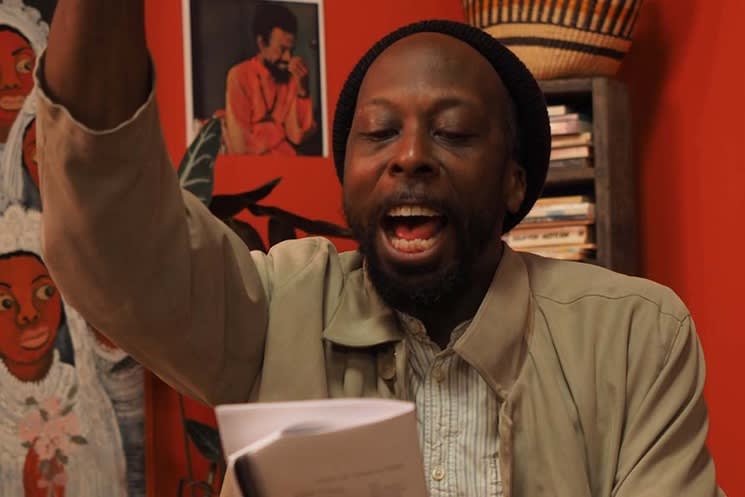After inheriting his grandmother's house in Philadelphia, Julian (Eric Lockley) and his girlfriend Gwen (Nozipho Mclean) decide to form a socialist collective, the House of Ubuntu, that embraces the culture and traditions of the African diaspora, while providing an educational and communal neighbourhood space. So goes the narrative thread of The Inheritance, which evokes the potential explosiveness of such a living arrangement, and while some drama thrives, the film is less Real World, and more French New Wave.
Simply saying this film is rich would be reductive of the complexity of textures writer and director Ephraim Asili layers throughout. Though it is his feature debut, Asili has been making short films for years (The Diaspora Suite), and based The Inheritance on his own formative involvement with MOVE, the Philadelphia-based Black liberation organization led by John Africa, as well as his time as part of an activist collective in his early 20s. Part narrative, part documentary, and shot on Super 16mm by Asili, the film blends the activities of this fictitious group of young liberationists with examinations of text, poetry, music and activism, at once re-canonizing and re-contextualizing them as part of the same revolutionary fabric that lives on. The film's gorgeous primary color palette, as well as the prominently placed La Chinoise poster in the house, winks at the throughline between the past and present.
In between innocuous quibbles, like delegating chores to certain days of the week (so effortless in its humor, Asili clearly lived it), the seriousness and dedication of the cause that brings the housemates together is never a side note. MOVE members Debbie Africa, Mike Africa Sr., and Mike Africa Jr. lead a presentation to the house, where the film introduces a lengthier archival segment about the organization's history, including the horrific airstrike of their headquarters by police in 1985. Throughout the film, poets Sonia Sanchez and Ursula Rucker are also featured among other prominent artists, musicians, activists and politicians, such as Shirley Chisholm.
Asili carefully collected pieces of the set over a long time and designed it within a black box studio. Whether hanging on the walls of the house, in a chest full of books, on a record player, as words spoken by the actors, or as a highlighted pieces of archival material, these objects — like the characters in The Inheritance — are conduits for exploring, celebrating and continuing a dialogue with the past. This glorious carousel of Black cultural and radical iconography and ideology itself becomes part of this discourse, within the House of Ubuntu and beyond its walls.
(Asili Vision)Simply saying this film is rich would be reductive of the complexity of textures writer and director Ephraim Asili layers throughout. Though it is his feature debut, Asili has been making short films for years (The Diaspora Suite), and based The Inheritance on his own formative involvement with MOVE, the Philadelphia-based Black liberation organization led by John Africa, as well as his time as part of an activist collective in his early 20s. Part narrative, part documentary, and shot on Super 16mm by Asili, the film blends the activities of this fictitious group of young liberationists with examinations of text, poetry, music and activism, at once re-canonizing and re-contextualizing them as part of the same revolutionary fabric that lives on. The film's gorgeous primary color palette, as well as the prominently placed La Chinoise poster in the house, winks at the throughline between the past and present.
In between innocuous quibbles, like delegating chores to certain days of the week (so effortless in its humor, Asili clearly lived it), the seriousness and dedication of the cause that brings the housemates together is never a side note. MOVE members Debbie Africa, Mike Africa Sr., and Mike Africa Jr. lead a presentation to the house, where the film introduces a lengthier archival segment about the organization's history, including the horrific airstrike of their headquarters by police in 1985. Throughout the film, poets Sonia Sanchez and Ursula Rucker are also featured among other prominent artists, musicians, activists and politicians, such as Shirley Chisholm.
Asili carefully collected pieces of the set over a long time and designed it within a black box studio. Whether hanging on the walls of the house, in a chest full of books, on a record player, as words spoken by the actors, or as a highlighted pieces of archival material, these objects — like the characters in The Inheritance — are conduits for exploring, celebrating and continuing a dialogue with the past. This glorious carousel of Black cultural and radical iconography and ideology itself becomes part of this discourse, within the House of Ubuntu and beyond its walls.
